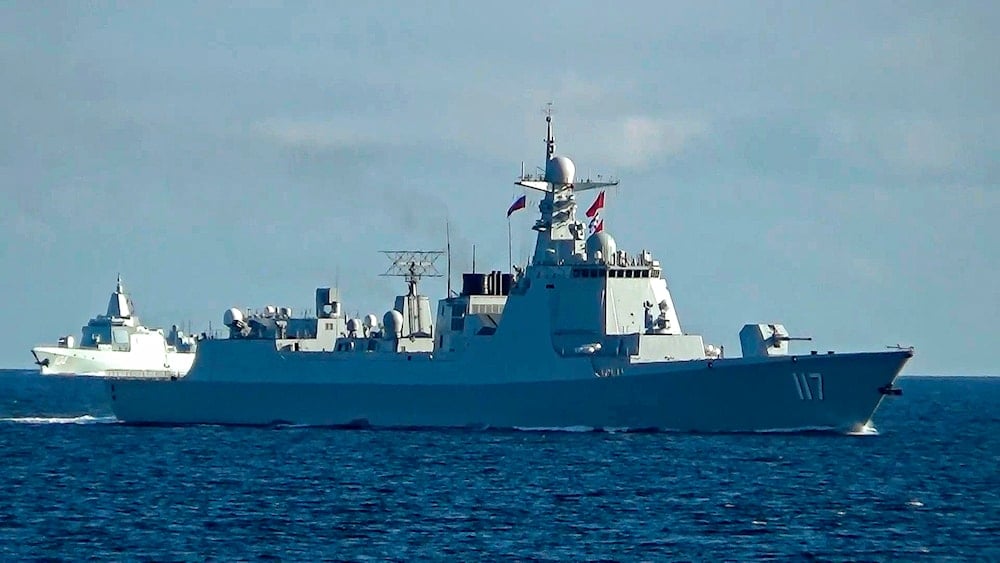US-Japan S.China Sea statement 'exaggerates regional tensions': China
US President Donald Trump and Japanese PM Shigeru Ishiba had reaffirmed their opposition to China’s "unlawful maritime claims" in the South China Sea.
-

Russian and Chinese warships sail in the Peter the Great Gulf during the Ocean-2024 drills, as seen in this Russian Defense Ministry video from Sept. 10, 2024 (AP)
Beijing condemned a joint statement issued by the United States and Japan on Monday, accusing it of "attacking and smearing" China after the two allies criticized what they referred to as "provocative activities" in the disputed South China Sea.
China asserts sovereignty over nearly the entire South China Sea, despite a 2016 international ruling that deemed its claims legally baseless.
Following their meeting in Washington on Friday, US President Donald Trump and Japanese Prime Minister Shigeru Ishiba reaffirmed their opposition to China’s "unlawful maritime claims, militarisation of reclaimed features, and threatening and provocative activities in the South China Sea."
Chinese Foreign Ministry spokesperson Guo Jiakun responded sharply, stating, "The China-related content of the US-Japan joint statement blatantly interferes in China’s internal affairs, attacks and smears China, and exaggerates regional tensions."
China had lodged "solemn representations" with both Washington and Tokyo, Guo added during a regular press briefing.
The meeting marked the first between Trump and Ishiba, with both leaders emphasizing the strength of decades-old security and trade ties and offering mutual praise.
Japan remains one of Washington’s closest allies in Asia, hosting approximately 54,000 US military personnel.
The South China Sea, an area crucial for naval trade, has been the center of much conflict that has been escalating in the past few months as China puts its foot down on its claim over the region, which overlaps Malaysia, the Philippines, Vietnam, and most importantly: Taiwan.
The Philippines filed a lawsuit against China over Chinese activity in the South China Sea and after three years, Manila won the lawsuit, outlawing Beijing's claims over the region and souring the diplomatic relation between the two countries.
The Philippines and the US are bound by a mutual defense treaty, raising concerns that recent maritime confrontations could escalate and draw in US forces.
In January, US Secretary of State Marco Rubio expressed "serious concern" over what he described as Beijing’s "coercive" actions in both the South China Sea and Taiwan during his first call with Chinese Foreign Minister Wang Yi.
China regards Taiwan as its own territory and has not ruled out the use of force to assert control over the self-ruled island.
In their joint statement, Trump and Ishiba reaffirmed their support for Taiwan’s participation in international organizations and opposed "any attempts to unilaterally change the status quo [in the Taiwan Strait] by force or coercion."
While most countries, including the United States, do not officially recognize Taiwan as a sovereign state, Washington remains Taipei’s primary arms supplier.
On Monday, Guo urged the United States and Japan to "clearly oppose Taiwan independence," adding, "If the relevant countries really care about peace and stability in the Taiwan Strait, they should abide by the one-China principle and clearly oppose Taiwan independence."
Japan and the US formed a partnership in November of 2024 where missile units will be deployed on the Nansei Islands in Japan, with the US Marine Corps' Marine Littoral Regiment, equipped with High Mobility Artillery Rocket Systems (HIMARS) playing a key role in this agreement.
The US bolstered its military partnerships with countries in the region including Japan, the Philippines, and Australia through increased joint exercises, arms sales, and deploying advanced military assets, which China views as provocative.
China launched several naval drills along with Moscow in the South China Sea in July of 2024, as well as intercontinental ballistic missile (ICBM) test launches towards the Pacific Ocean.

 4 Min Read
4 Min Read










